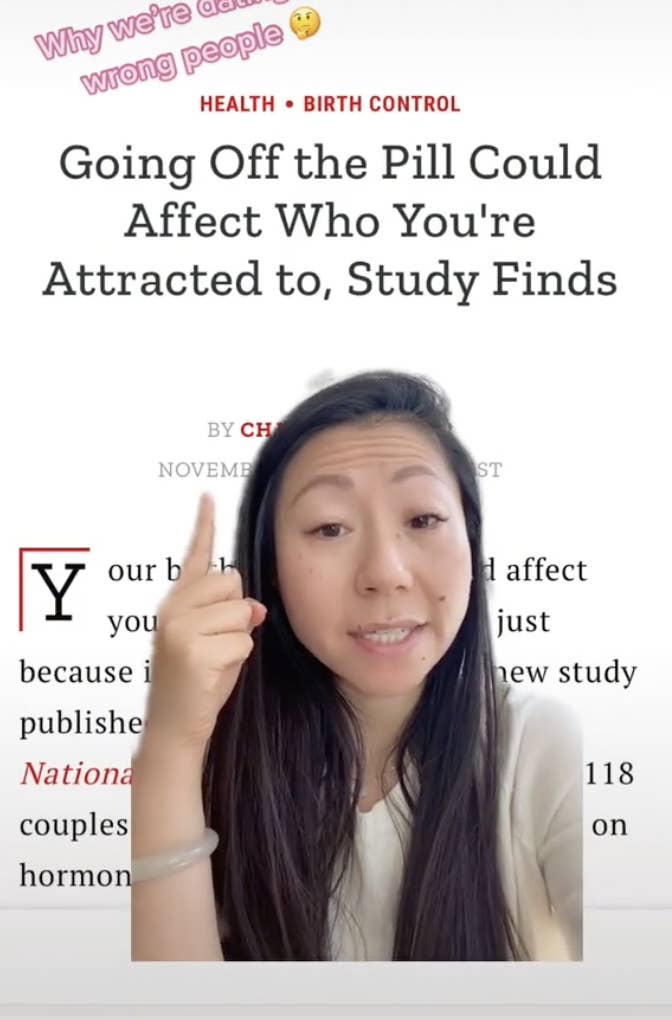When I was but a wee lass of 16 years old, I went on birth control pills to help with my cystic acne and period pain. They worked pretty well, so I continued! And here I am (over a decade later), still taking them every single day.

I've been lucky enough to not have many issues with my birth control, but I'll admit that when I first started taking the pill, I had pretty much zero guidance/info about how it might affect my body. And TBH, I still don't really understand the full extent of it, even after making a conscious effort to learn more.
So, imagine my shock and intrigue when I stumbled on this TikTok from Lulu Ge, an herbalist, psychologist, and founder of the wellness brand Elix. In the video, Lulu cites a 2014 study that suggests that taking the birth control pill may actually affect who you're attracted to.

The study Lulu's referring to in her video was published in the Proceedings of the National Academy of Science and followed 118 married (heterosexual) couples who met while the women were on birth control pills. Of the couples studied, the women who went off the pill reported being less attracted to their partners' facial features if their partner had a "relatively less attractive face," but more attracted if their partner had a "relatively more attractive face."
Lulu — who's trained in both Western and Eastern herbalism and has a master's degree in social organizational psychology — told BuzzFeed that her own struggles with post-hormonal birth control syndrome after going off the pill led her back to natural hormone solutions and the creation of Elix. She also (much like me) expressed surprise at the study:
"I knew that the pill has also been linked to increased risks of breast cancer, blood clots, heart disease, etc. and can trigger side effects such as headaches, nausea, and mood swings/anxiety — this was actually my personal experience on the pill, I just never felt like myself! I never made the connection before coming across this study that the pill could actually be linked to all my bad dating decisions and affecting who I was attracted to!"
And judging by the comments on Lulu's TikTok, there's more (anecdotal) evidence to back up what the study's saying.



Now, I'll be the first to admit that plenty of time has passed in the research world between 2014 and 2022, so I set out to see if there's been any further study on this topic since then. That led me to Dr. Sarah E. Hill, PhD, who's researched birth control's effect on the body extensively, and wrote the book This Is Your Brain on Birth Control: The Surprising Science of Women, Hormones, and the Law of Unintended Consequences.
Dr. Hill told BuzzFeed that birth control pills can affect so much more than our ability to become pregnant: "The birth control pill changes women’s sex hormones, which means that its effects go far beyond contraception. There are hormone receptors on virtually all cells in the body – including all major structures in the brain. Because of this, hormonal birth control can have an impact on nearly every aspect of who a woman is."
To date, research finds that hormonal birth control can influence all kinds of things, such as "a woman’s mate preferences" and even "her relationship satisfaction." She continued, telling BuzzFeed, "Researchers have only very recently begun to explore the psychological and behavioral effects of the pill, which means that the things we know are far outnumbered by the things we don’t."
"However, what is clear is that when you change women’s sex hormones, you change women," Dr. Hill said.
Dr. Hill cited even more research to support this theory: "In one study, researchers compared ratings of relationship quality given by women who had chosen their partners when they were on the pill to those given by women who had chosen their partners when they were not on the pill. They found that women who had chosen their partners while on the pill reported less sexual attraction to their partners, less sexual arousal in response to their partners, and less sexual adventurousness than women who had chosen their partners when they were not on the pill. Later studies have found that married women who chose their partners when on the pill, but then went off of it, report declining sexual satisfaction in response to their change in hormonal status."
When asked why she thinks this kind of information is generally unknown among birth control takers, Dr. Hill responded, "It's only very recently that researchers have taken the time to ask the question about how the hormonal changes caused by the birth control pill might affect the mind, the brain, and behavior."
"Because the research is new, and falls outside the purview of research on birth control safety and efficacy (which is the type of research that most doctors pay attention to), most doctors don’t know about it. And since most education about hormonal birth control comes to women from their doctors, they end up with a blind spot. They are not able to make an informed decision about the medication they’re about to take."
"That was my motivation behind writing This Is Your Brain on Birth Control. I wanted to educate women about the range of psychological and behavioral side effects that can happen with the pill, so that way, all women would be able to make an informed decision about whether hormonal birth control is right for them."
Informed consent should be non-negotiable when taking hormonal birth control. It's also important to remember that there are other options out there! Dr. Mary Jane Minkin, MD, a clinical professor of obstetrics, gynecology, and reproductive sciences at Yale University School of Medicine, told BuzzFeed, "'The key thing that I always tell people is, 'I can get you a very reliable non-hormonal contraceptive.'"
"I think what [patients] need to remember is that nothing is binding them to doing this forever. If they don't like it, or it's not working for them, call the provider and say, 'this isn't working out for me.'"

